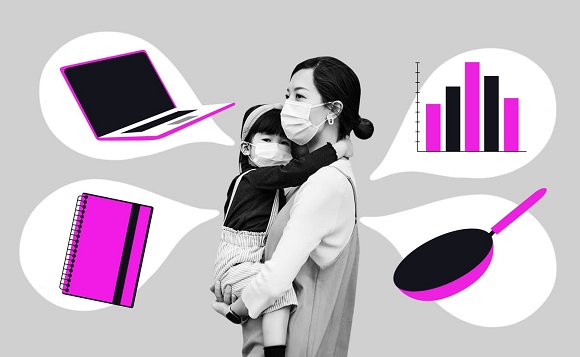
|
|

|
|
| April 19, 2024 |
|
Pandemic redefines women’s career ambitions 
Working more than a year under pandemic conditions threw into sharp relief what Vicki Klaker wanted from her career—and wasn’t getting.
At first, the marketing specialist and mother of five plowed through the long days of working from her home near Wichita, Kan., while overseeing her children’s online learning. Soon, though, “remote work was a double-edged sword,” the 38-year-old says. Being more available to her family was gratifying and made her wonder whether another line of work would let her spend more time with them. In her corporate job at a fast-growing restaurant chain, working from home meant monitoring emails often into the evening, leaving her both depleted and unfulfilled. “I realized, ‘I’m not being fulfilled because I’m not helping people, and I don’t want to waste any more time,’ ” says Mrs. Klaker, who had always dreamed of becoming a teacher. This spring, she applied for a position at an area school district and, to her surprise, got it. As of last month, she teaches high-school students how to code and build websites, and isn’t looking back. “My definition of success has changed,” she says. The pandemic has been especially brutal for women. They suffered a disproportionate number of layoffs, took on more home responsibilities and made more career sacrifices to manage the collapse of in-school learning and child-care arrangements, research shows. But those stresses have also motivated many women to redefine their ambitions and reset the terms of their careers. Some, like Mrs. Klaker, are forging new careers to pursue old passions or switching to jobs better suited to family lives. Some are starting new businesses, while others have moved to far-flung places or taken a pause to plot their next career move. And many are taking the leap to bigger roles, but with greater expectations of work flexibility than in pre-Covid-19 times. A burnout crisis New, major research shows just how restless—and spent—many professional women are. Thousands of men and women surveyed this past summer for the seventh annual Women in the Workplace study by McKinsey & Co. and LeanIn.Org reported burnout at even higher rates than last year—by then, several months into the pandemic. But women appear to be feeling the exhaustion more acutely. About 42% said they felt burned out often or almost always, compared with 35% of men. Among female team managers, more than half described themselves as burned out, while 41% of their male peers did. Story Date: January 18, 2022
|